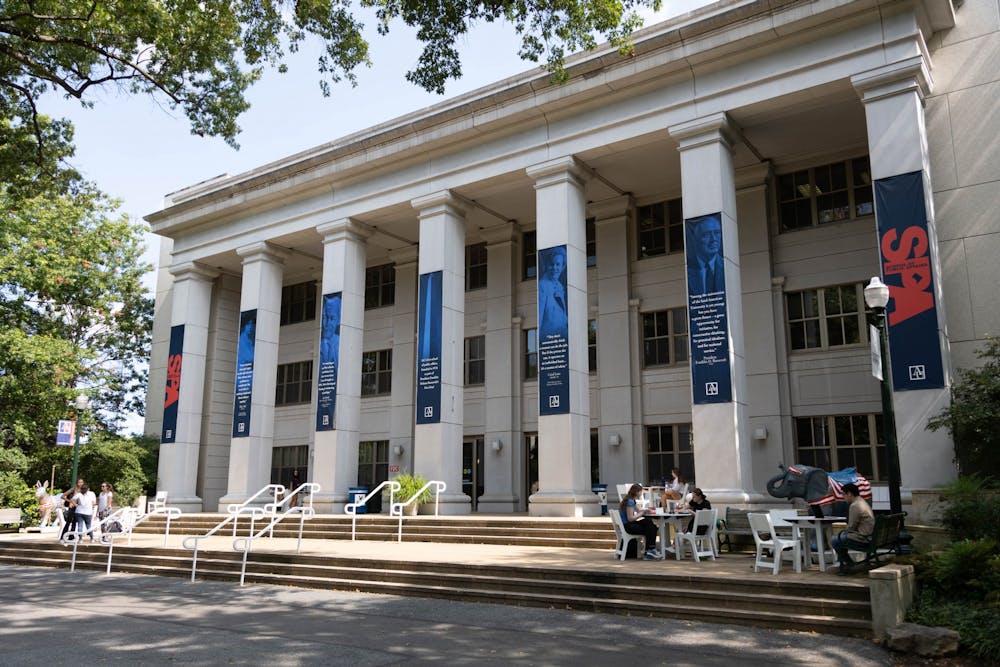Editor’s Note: This story contains mention of assault and abuse.
As a survivor of abuse, domestic violence activist Beverly Gooden shared her story and offered strategies to help college students identify harmful relationship behavior during a virtual event on Oct. 5.
Gooden began the #WhyIStayed movement on Twitter in 2014, and shared its origin during the event, which was co-sponsored by the Kennedy Political Union and Women’s Initiative. Gooden said she left her marriage in 2010 after two years of physical and emotional abuse, when footage surfaced of NFL player Ray Rice physically assaulting his then-fiancée, Janay Palmer, in an elevator.
Gooden said she was inspired to speak out after she noticed that much of the public response to the video scrutinized Palmer’s behavior rather than Rice’s, with many people questioning why Palmer would stay with Rice despite the apparent abuse.
“There were so many other questions that you could ask, but of all the things that just happened in that TMZ video, [people asked] ‘Why would she stay with him?’” Gooden said.
In response to the backlash against Palmer, Gooden sent out a series of tweets with the hashtag #WhyIStayed to shed light on her perspective as a survivor of domestic violence who did not escape the relationship for a number of years.
When she checked her Twitter a couple of hours after posting her tweets, Gooden found that #WhyIStayed was trending on Twitter. She said she was surprised by the attention her story was garnering because domestic violence “didn’t trend on Twitter back then.”
Since starting the #WhyIStayed movement with these tweets, Gooden has focused on advocating for empathy and support for survivors of domestic violence.
At the virtual event, Gooden identified three reasons that often explain why victims do not immediately leave their abusers, including emotional or financial dependence and fear of threats. She also discussed the power that love holds over many victims, noting that most abusive partners are “great and loving” at the beginning of relationships.
“I wanted to spend my life with [my ex-husband], and that kept me there,” Gooden said. “Just the hope of being in love.”
Gooden emphasized that it is important to know the signs of domestic violence, especially for individuals who are of college age.
According to statistics from the National Domestic Violence Hotline that Gooden shared, 57 percent of college students who report abuse said it occurred while they were at their university. She added that most people experience some form of dating violence before the age of 25.
“That’s here, that’s now, that’s someone you know,” Gooden said.
Gooden discussed two cases of college students who were murdered by abusive partners: 18-year-old Alex Kogut of SUNY Brockport in 2012 and 22-year-old Nadia Ezaldein of the University of Chicago in 2014.
Kogut, who was beaten to death in her dorm room by boyfriend Clayton Whittemore, sent a tweet hours before her murder that read, “Should’ve known.” Gooden said that cryptic social media posts are a potential warning sign of domestic violence and encouraged college students to view them as an “opportunity” to ask questions.
“Not invasive questions or what could be considered nosy questions,” Gooden said. “Just general questions like, ‘What does that mean?’”
Gooden shared that her upcoming memoir, “Surviving: Why We Stay and How We Leave Abusive Relationships,” is dedicated to Ezaldein, who was fatally shot by ex-boyfriend Marcus Dee on her 22nd birthday while working at a Nordstrom in Chicago. Seven months prior to the murder, Ezaldein applied for a protective order against Dee after a violent confrontation.
“She did everything everyone says she should do,” Gooden said. “She left, she tried to file a restraining order, she tried to get help. He just kept going.”
Gooden cited Ezaldein’s story as further evidence for the importance of supporting domestic violence victims, noting another statistic that women are 70 times more likely to experience abuse in the two weeks after leaving an abusive relationship.
Gooden said that the public resorts to victim-blaming because “it’s easier to view a victim as blameworthy than to accept the fact that the world is not just and things happen to us or around us that we didn’t deserve.”
“We’re coming from a place where anything can happen to anyone so long as the systems are in place that allows these things to happen,” Gooden said.
Gooden added that certain identities are especially at-risk for falling victim to domestic violence, including Black women, the LGBTQ+ community and disabled populations. She encouraged individuals who feel comfortable to speak out on behalf of these groups.
“Someone might hear you and relate or someone might hear you and learn,” Gooden said.
However, Gooden cautioned against “performative” activism. She advised aspiring activists who use social media to remain vocal on their platform, even when they do not expect their efforts to be “rewarded with clout.”
“I think it is about being consistent in your activism, being active in whatever area of activism you are in regardless of whether there’s anything in the news about it,” Gooden said.
Gooden also spoke on the coronavirus pandemic’s impact on services for domestic violence survivors, noting that virtual counseling options and online pickups for clothing and food represent an effort among agencies to “[take] a very bad situation and [use] it as an opportunity to improve services.”





